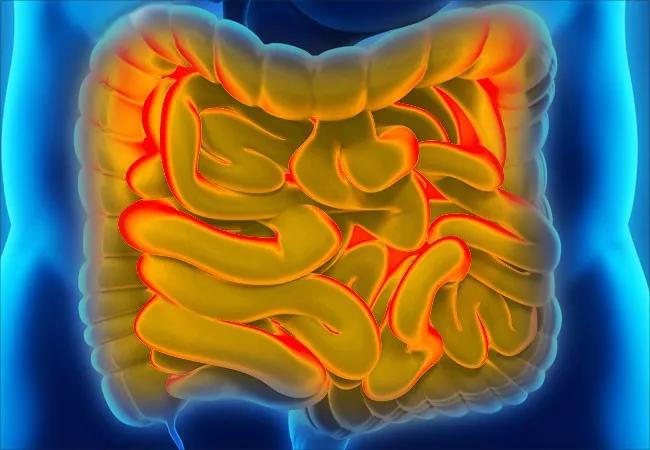Results of largest medical records-based analysis to date

Image content: This image is available to view online.
View image online (https://assets.clevelandclinic.org/transform/09fb1277-de9a-41c2-9ac4-72a45d1a822e/bowels_jpg)
bowels
Celiac disease and inflammatory bowel disease (IBD) have similar presentations and both are characterized by chronic immune-mediated gastrointestinal tract inflammation. While associations between the two conditions have been documented in the literature, a new study led by Cleveland Clinic investigators is the first to suggest a bidirectional link and to reveal the impact of IBD treatment on celiac disease.
Advertisement
Cleveland Clinic is a non-profit academic medical center. Advertising on our site helps support our mission. We do not endorse non-Cleveland Clinic products or services. Policy
“This is the largest database study to evaluate the association between celiac disease and IBD and the impact of IBD therapy on celiac disease incidence, says Mohannad Abou Saleh, MD, a gastroenterologist at Cleveland Clinic and co-author of the report. “It suggests that there is a strong link between celiac disease and IBD that is bidirectional, but it seems that patients with celiac disease are more likely to develop IBD than vice versa.”
The findings, published in Inflammatory Bowel Diseases, are from a retrospective analysis of information in an electronic health record database (Explorys Inc.) that reflects experience in more than 72 million patients treated in 26 American health care systems. Of the individuals represented in the database, nearly 144,000 had celiac disease (0.18%), nearly 200,000 (0.26%) had ulcerative colitis (UC), and nearly 231,000 (0.32%) had Crohn disease (CD).
For the study, the authors selected a cohort of patients diagnosed with celiac disease and IBD between 1999 and 2020. They used a multivariate model to compare patients with IBD to patients without IBD, and to compare patients with celiac disease to those without celiac disease.
Data about the patients that were extracted from the database included age, sex, and race, plus information on potential confounding factors such as tobacco smoking and use of corticosteroids, immunomodulators, biological agents, and nonsteroidal anti-inflammatory drugs.
The authors found that patients with IBD were more likely to have a diagnosis of celiac disease (odds ratio [OR] 13.680; confidence interval [CI], 13.454-13.909; P<0.0001). The risk association of celiac disease was higher with CD (OR 24.473; 95%CI 23.981-24.974; P<0.0001) compared with UC (OR 5.686; 95% CI, 5.686-5.979; P<0.0001).
Advertisement
Examining the impact of pharmacotherapy, it was clear that risk of an association with celiac disease was lower for patients treated for UC and CD than for those who were not being treated for IBD. ORs for treatment versus nontreatment were 0.407 and 0.585 with corticosteroids, 0.124 and 0.127 with 5-aminosalicylates (5-ASAs), 0.385 and 0.425 with immunomodulators (azathioprine, 6-mercaptopurine, and methotrexate), and 0.215 and 0.242 with antitumor necrosis factor drugs (infliximab, adalimumab, and certolizumab). There was no lower risk association in the vedolizumab group but there was a higher risk association in the ustekinumab group (ORs 1.4 and 1.394 for CD, respectively).
“We think the lower risk association between IBD and celiac disease seen in patients treated with immunomodulators may indicate that the drugs have a protective effect,” says Motasem Alkhayyat, MD, a gastroenterology fellow at Cleveland Clinic and first author of the study. Similarly, the authors noted that the anti-inflammatory and antioxidant effects of 5-ASAs may restore the oxidative balance in patients with celiac disease.
Because its conclusions originate from a database analysis, the study has some inherent limitations. Among them are: potential bias in how celiac disease was classified; lack of objective validation of diagnoses of celiac disease and IBD; and possible overdiagnosis of celiac disease in IBD or vice versa. Nevertheless, the authors believe the results have important clinical implications.
Advertisement
“Our results indicate that in patients with IBD who have unexplained anemia or refractory IBD, clinicians should have increased suspicion for celiac disease,” says Alberto Rubio Tapia, MD, Director of the Celiac Disease Program at Cleveland Clinic and coauthor of the study. “Conversely, in the appropriate clinical context, an evaluation for IBD should be done in patients who have celiac disease that does not respond to treatment.”
Advertisement
Advertisement
Benefits of neoadjuvant immunotherapy reflect emerging standard of care
Multidisciplinary framework ensures safe weight loss, prevents sarcopenia and enhances adherence
Study reveals key differences between antibiotics, but treatment decisions should still consider patient factors
Key points highlight the critical role of surveillance, as well as opportunities for further advancement in genetic counseling
Potentially cost-effective addition to standard GERD management in post-transplant patients
Findings could help clinicians make more informed decisions about medication recommendations
Insights from Dr. de Buck on his background, colorectal surgery and the future of IBD care
Retrospective analysis looks at data from more than 5000 patients across 40 years